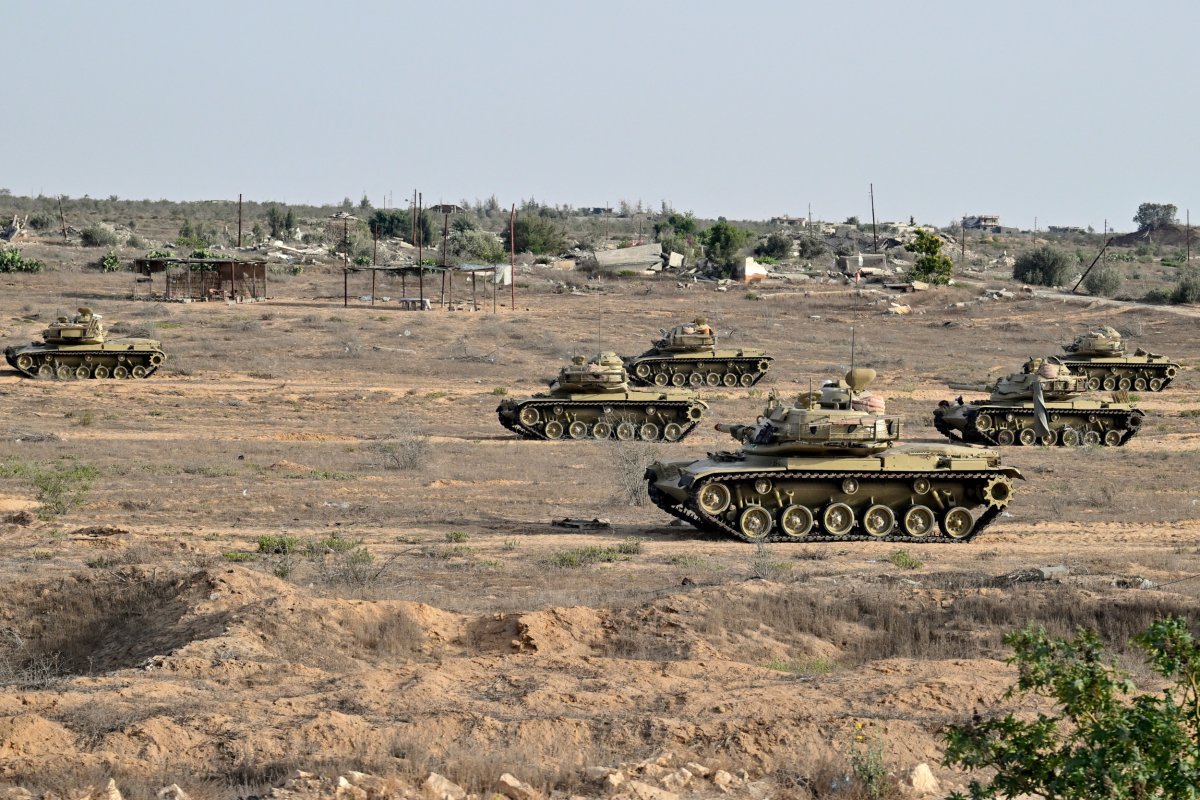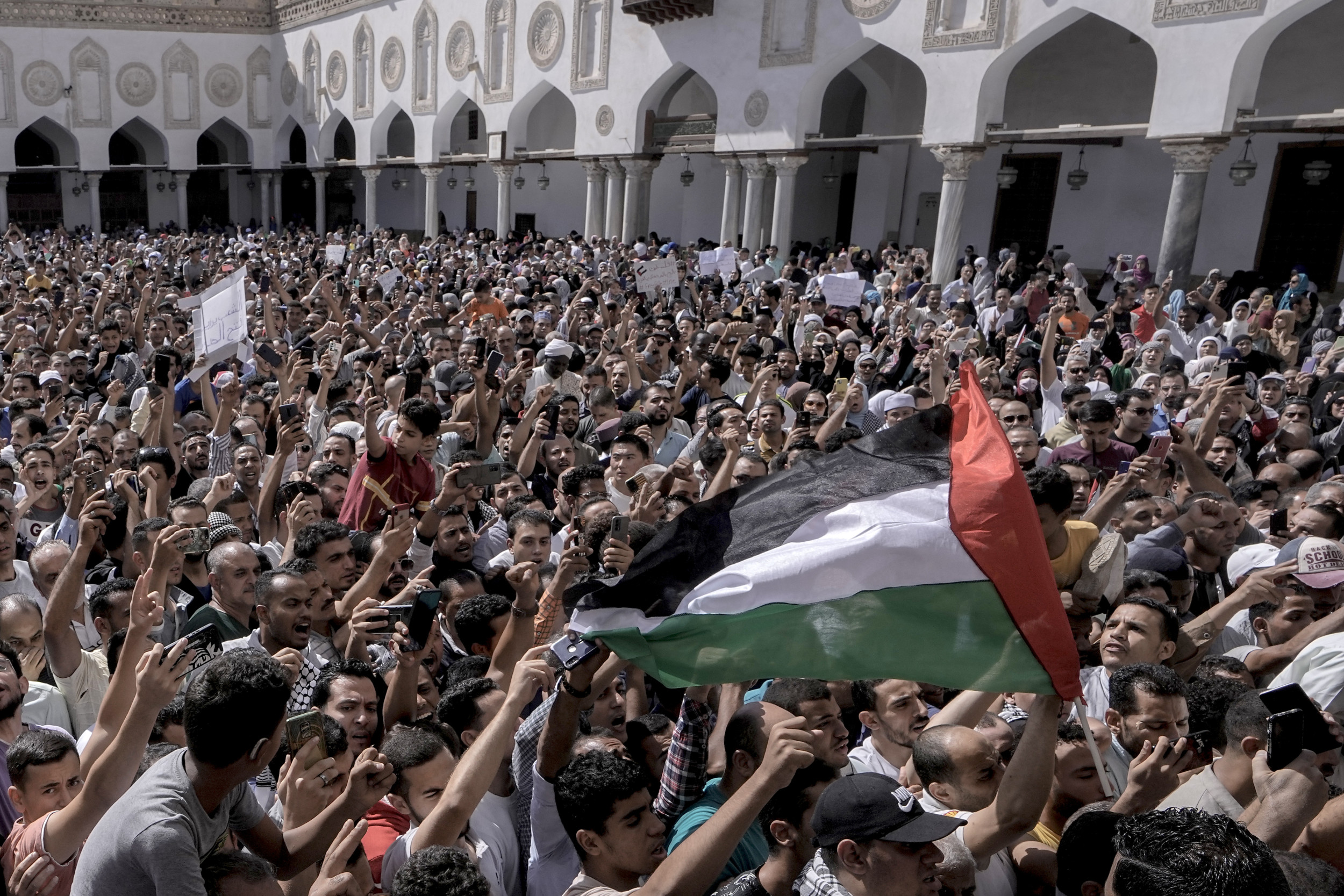🎙️ Voice is AI-generated. Inconsistencies may occur.
Tensions have escalated in recent weeks between Israel and Egypt over military activities in Egypt's Sinai Peninsula.
The tensions have deepened since U.S. President Donald Trump raised the possibility of Palestinians from the devastated Gaza Strip moving into Egypt, a suggestion that Cairo has rejected.
They add another dimension to the worsening insecurity in the region since Gaza was plunged into war by the Hamas attack on Israel in October 2023.
Newsweek has reached out to the Egyptian government for comment. The Multinational Force and Observers (MFO), overseeing the implementation of the 1979 Egypt-Israel peace treaty, declined to comment.
Israeli Accusations
Israeli officials have raised an alarm about Egypt's increasing military presence in the northern Sinai Peninsula, which borders both Israel and the Gaza Strip. The Israeli officials have cited the construction of new bases and the expansion in the number of forces deployed.
In March, Israeli Defense Minister Yoav Katz warned Egypt against breaching its 1979 peace treaty with Israel, which places limits on the military presence the Egyptians are allowed in the region.
Although Egypt has not officially responded, officials and analysts have confirmed that military capabilities in Sinai have been enhanced.
Brigadier Samir Farrag, an ex-senior Egyptian military officer, attributed this buildup to national security concerns, particularly regarding the threat posed by militant groups operating in the region and has told Arabic media that Egypt deployed more forces near Rafah, on the border with the Gaza Strip, with Israeli coordination.
Hamas Tunnels
The Sinai Peninsula's proximity to Gaza has made it a focal point for Hamas activities. Israeli officials have accused Egypt of not doing enough to control smuggling tunnels used by Hamas to transport weapons and fighters.
These tunnels, often in the Rafah area, have been a significant security concern for Israel.
Since taking power in 2014, President Sisi has led an internal war on insurgent groups, implementing a military crackdown on ISIS-linked militant groups in northern Sinai.
In 2018, Egypt launched a large-scale military operation that was reported by media to have destroyed thousands of tunnels used for smuggling weapons to armed groups.
Moving Gazans to Egypt
In January, Trump suggested moving the Palestinian population of Gaza — possibly to Egypt and Jordan — in a meeting with Israeli Prime Minister Benjamin Netanyahu, reviving an idea initially raised by Israeli officials since the mid-2000s.
Egypt ruled Gaza until it was captured by Israel in the 1967 Middle East war while Jordan ruled the West Bank.
Both Egypt and Jordan highly rejected Trump's idea in a united Arab stance opposing "a displacement of the Palestinian people".
After Trump's remarks, Egyptian President Abdel Fattah el-Sisi said: "The Egyptian people can rest assured that there can never be any leniency or allowance for compromising Egyptian national security."
Jordan has hosted large numbers of Palestinian refugees for more than 70 years and the majority have been granted citizenship,
In Egypt, the matter is much more sensitive — particularly given the ties of Hamas to the banned Muslim Brotherhood.
Egypt was estimated to host around 135,000 Palestinian refugees, according to the International Organization for Migration in 2022, with nearly as many arriving following the Gaza conflict that began in October 2023, according to Palestinian tallies.
Military Activities Along Gaza Border
In 2014, Sisi's government oversaw the demolition of hundreds of homes and forced evictions from the Egyptian side of Rafah in order to create a buffer zone along the border with the Gaza Strip, following a deadly attack on a military checkpoint in North Sinai.
In the following years, Egypt expanded military bases and deployed more soldiers, according to media reports and satellite imagery. Israel says the Egyptians have now exceeded troop limits stipulated by the peace treaty.
In 2024, Israel took control of a strategic corridor along Gaza's border with Egypt known as the Philadelphi Corridor - a buffer zone stretching over nine miles from the Mediterranean Sea to the point where the borders of Egypt, the Gaza Strip, and Israel meet - as well as the Rafah border crossing. It cited a need to curb the threat from Hamas threat.
Egypt considered Israel to have breached the limits of military presence near areas demilitarized under the treaty, raising tensions. The total length of the border between Israel and Egypt is nearly 130 miles.

The 1979 Peace Treaty
Facilitated by the United States, the Camp David Accords were signed between Israel and Egypt in 1979 to establish four security zones in the Sinai and Israel along the international border where limitations on military forces and equipment are stipulated.
The treaty followed the 1973 Middle East war in which Egyptian forces launched a surprise attack on Israelis then occupying the Sinai Peninsula and initially made dramatic gains before Israel counterattacked and pushed them back. Since the treaty, Egypt has also continued to benefit from major U.S. aid.
A multinational force and observers now supervise the implementation of security provisions to prevent violations of the terms of the Camp David Accords.
Both sides have emphasized their commitment to the accords, but the latest developments have put them under strain.
Previously, both countries shared intelligence information and security coordination to counter threats in the area.
What People Are Saying
Israeli Ambassador to the U.S. Yechiel Leiter, in January: "Cairo has constructed military bases in Sinai that can only be used for offensive operations, for offensive weapons—that's a clear violation. Egypt's breach is an issue that is going to come to the fore because it's not tolerable. For a long time, it's been shunted aside, and this continues. This is going to be an issue that we're going to put on the table very soon and very emphatically."
Prominent Egyptian Parliamentarian Mostafa Bakry on X: "When the Zionist Minister of War says that Israel will not accept the increasing Egyptian military presence in Sinai, we can only respond: Sinai is Egyptian land, and you have violated the peace agreement with Egypt by occupying the Salahuddin Axis (Philadelphi Corridor). As for this blackmail, it is categorically and entirely rejected. The world has witnessed your lies, and your excuses are false. You are attempting to win the world's sympathy in an effort to cover up your genocidal war and your internal crisis. Stop the blackmail. Egypt is not an easy target, and Egypt is capable of teaching you lessons you will never forget."
What Happens Next
The growing tensions add an additional complication for the Trump administration as it seeks to quell the perennial conflict in the Middle East. The Camp David Accords are a key pillar of regional security.
About the writer
Amira El-Fekki is a Newsweek reporter based in Dubai. Her focus is reporting on politics and society in the Middle ... Read more




